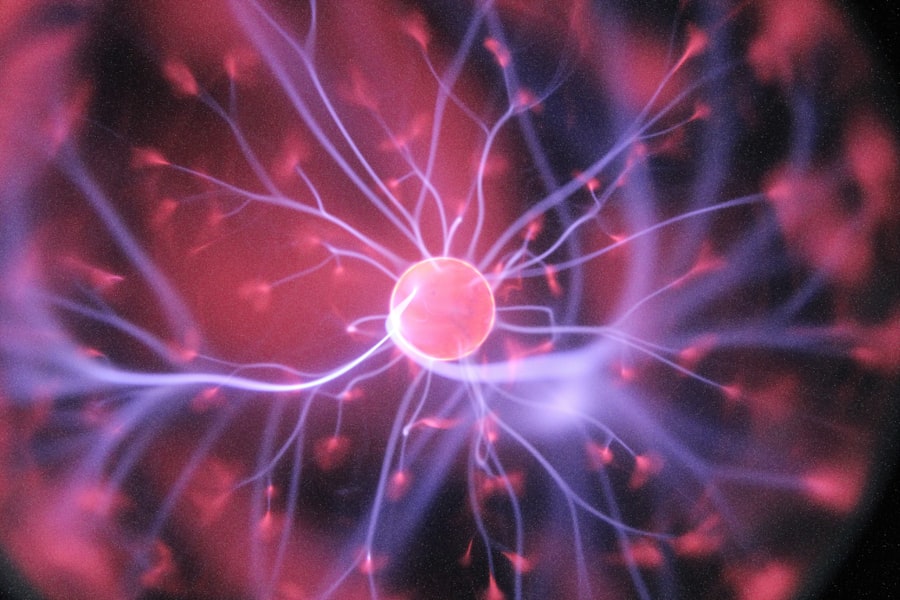Numbness is a complex and often misunderstood experience that many individuals encounter at various points in their lives. It can manifest as a physical sensation, an emotional state, or a combination of both. When you feel numb, it may seem as though you are disconnected from your body or your emotions, leading to a sense of isolation and confusion.
This disconnection can be alarming, as it often leaves you questioning the reasons behind your feelings—or lack thereof. Understanding numbness is crucial, as it can serve as a signal that something deeper is at play, urging you to explore your emotional landscape. In a world that often demands constant engagement and emotional availability, numbness can feel like a refuge.
By delving into the various dimensions of numbness, you can begin to unravel its complexities and understand how it affects your life. This exploration will not only help you identify the roots of your numbness but also empower you to take steps toward healing and reconnection with your emotions.
Key Takeaways
- Numbness is a common experience that can affect both physical and emotional aspects of a person’s life.
- Trauma, stress, and overwhelm are common causes of numbness, which can be a coping mechanism for the mind and body.
- Defense mechanisms play a role in numbness, as the mind may shut down to protect itself from overwhelming emotions.
- Dissociation is a form of numbness that involves disconnecting from one’s thoughts, feelings, or sense of identity.
- Numbness can impact relationships, as it may lead to difficulties in communication and emotional connection.
The Physical and Emotional Aspects of Numbness
Numbness can present itself in both physical and emotional forms, creating a multifaceted experience that can be challenging to navigate. Physically, you may notice sensations such as tingling, a lack of feeling in certain areas of your body, or even a complete absence of sensation. These physical manifestations can be disconcerting, leading you to question whether there is an underlying medical issue or if it is purely emotional in nature.
Understanding the physical aspect of numbness is essential, as it can help you differentiate between potential health concerns and emotional responses. Emotionally, numbness often feels like a fog settling over your mind and heart. You may find it difficult to connect with your feelings or experience joy, sadness, or anger in the way you once did.
This emotional detachment can lead to a sense of emptiness or disconnection from yourself and others. You might feel as though you are merely going through the motions of life without truly engaging with it. Recognizing these emotional aspects of numbness is vital for understanding how they impact your overall well-being and relationships.
Causes of Numbness: Trauma, Stress, and Overwhelm

The roots of numbness often lie in experiences of trauma, stress, or overwhelming situations. When faced with significant emotional pain or distressing events, your mind may instinctively shut down as a protective mechanism. This response can be particularly pronounced in individuals who have experienced trauma, as the brain seeks to shield itself from further harm.
You may find that past experiences continue to influence your present emotional state, leading to feelings of numbness when confronted with stressors. Stressful situations can also contribute to feelings of numbness. When life becomes chaotic or overwhelming, your body may respond by entering a state of survival mode, where emotions are suppressed in favor of functionality.
In these moments, you might feel as though you are merely existing rather than truly living. Recognizing the connection between stress and numbness can help you identify triggers in your life and develop strategies for managing them more effectively.
The Role of Defense Mechanisms in Numbness
| Defense Mechanism | Description |
|---|---|
| Denial | Refusing to acknowledge the reality of a situation or emotion |
| Repression | Unconsciously blocking out painful or threatening thoughts or feelings |
| Rationalization | Creating logical explanations to justify or excuse unacceptable behavior or feelings |
| Projection | Attributing one’s own unacceptable thoughts or feelings to others |
| Displacement | Redirecting emotions from the original source to a substitute target |
Defense mechanisms play a significant role in the experience of numbness, acting as psychological shields that protect you from emotional pain. When faced with distressing thoughts or feelings, your mind may employ various strategies to cope with the situation. Numbness can be seen as one such defense mechanism—an unconscious way of avoiding the discomfort associated with certain emotions or experiences.
By understanding how these mechanisms operate, you can gain insight into your own responses to stress and trauma. For instance, repression is a common defense mechanism that involves pushing painful memories or emotions out of conscious awareness. This can lead to feelings of numbness as you distance yourself from the very experiences that require acknowledgment and healing.
Similarly, denial may cause you to refuse to accept certain realities, resulting in emotional detachment. By recognizing these patterns within yourself, you can begin to dismantle the defenses that contribute to your numbness and work toward a more authentic engagement with your emotions.
Understanding Dissociation and Numbness
Dissociation is another phenomenon closely linked to numbness, often serving as a coping mechanism during times of extreme stress or trauma. When you dissociate, you may feel disconnected from your thoughts, feelings, or sense of self—similar to the experience of numbness. This disconnection can manifest in various ways, such as feeling detached from your body or experiencing time distortions.
Understanding dissociation is crucial for recognizing how it intertwines with numbness and affects your overall emotional health. The relationship between dissociation and numbness can be particularly pronounced in individuals who have experienced significant trauma. In these cases, dissociation may serve as a way to escape overwhelming emotions or memories that are too painful to confront directly.
While this response may provide temporary relief, it can also hinder your ability to process emotions fully and engage with life meaningfully. By exploring the nuances of dissociation and its connection to numbness, you can begin to address these patterns and work toward healing.
Numbness as a Coping Mechanism

Numbness often emerges as a coping mechanism in response to overwhelming emotions or experiences. When faced with situations that feel too intense or unmanageable, your mind may instinctively resort to numbing feelings as a way to cope. This response can be particularly prevalent in individuals who have experienced trauma or chronic stress, where emotional overload becomes a daily reality.
While this coping strategy may provide temporary relief from pain or anxiety, it ultimately prevents you from fully engaging with your emotions and processing them in a healthy way. As a coping mechanism, numbness can create a false sense of safety by allowing you to avoid confronting difficult feelings. However, this avoidance comes at a cost; over time, it can lead to increased emotional disconnection and isolation.
You may find yourself struggling to connect with others or feeling detached from experiences that once brought you joy. Recognizing numbness as a coping mechanism is an essential step toward understanding its impact on your life and taking proactive steps toward healing.
The Impact of Numbness on Relationships
Numbness can have profound effects on your relationships with others, often creating barriers that hinder genuine connection and intimacy. When you feel emotionally detached, it becomes challenging to engage fully with those around you—whether friends, family members, or romantic partners.
Moreover, your own inability to express emotions can create feelings of isolation and loneliness within relationships. You might find yourself withdrawing from social interactions or avoiding deep conversations altogether. This withdrawal can perpetuate a cycle of numbness, where the lack of emotional engagement reinforces feelings of disconnection.
By acknowledging the impact of numbness on your relationships, you can begin to take steps toward rebuilding connections and fostering deeper emotional intimacy.
Recognizing and Addressing Numbness in Yourself and Others
Recognizing numbness in yourself is the first step toward addressing its underlying causes and effects. You may notice signs such as emotional detachment, difficulty experiencing joy or sadness, or physical sensations of numbness in certain areas of your body. By paying attention to these signals, you can begin to explore the factors contributing to your state of numbness—whether they stem from past trauma, current stressors, or defense mechanisms at play.
When it comes to recognizing numbness in others, it’s essential to approach the situation with empathy and understanding. Friends or loved ones who exhibit signs of emotional detachment may be struggling with their own internal battles. By offering support and creating a safe space for open dialogue, you can encourage them to share their experiences and feelings without judgment.
This mutual recognition of numbness can foster deeper connections and pave the way for healing.
Coping Strategies for Dealing with Numbness
Developing effective coping strategies is crucial for managing feelings of numbness and reconnecting with your emotions. One approach is mindfulness practice, which encourages you to stay present in the moment and observe your thoughts and feelings without judgment. Engaging in mindfulness exercises—such as meditation or deep breathing—can help ground you in your body and promote awareness of your emotional state.
Another strategy involves journaling as a means of self-reflection. Writing about your thoughts and feelings can provide an outlet for expression while helping you process complex emotions that may contribute to numbness. Additionally, engaging in creative activities—such as art or music—can serve as powerful tools for reconnecting with your emotions and expressing what may be difficult to articulate verbally.
Seeking Professional Help for Numbness
If feelings of numbness persist or significantly impact your daily life, seeking professional help may be necessary for healing and recovery. A mental health professional can provide valuable support by helping you explore the underlying causes of your numbness while offering coping strategies tailored to your unique situation. Therapy can create a safe space for you to process difficult emotions and experiences while guiding you toward healthier ways of engaging with yourself and others.
In some cases, medication may also be recommended as part of a comprehensive treatment plan for managing symptoms associated with numbness—particularly if they are linked to anxiety or depression. Collaborating with a healthcare provider ensures that you receive the appropriate care needed for addressing both the physical and emotional aspects of numbness.
Moving Forward: Healing from Numbness and Reconnecting with Emotions
Healing from numbness is an ongoing journey that requires patience and self-compassion. As you work through the layers of disconnection that have developed over time, it’s essential to approach yourself with kindness rather than judgment. Acknowledging that healing takes time allows you to embrace the process without placing undue pressure on yourself.
Reconnecting with your emotions involves gradually allowing yourself to feel again—whether through therapy, creative expression, or mindfulness practices. As you begin to engage more fully with your feelings, you may discover new depths of joy, sadness, love, and connection that were previously obscured by numbness. By taking small steps toward emotional engagement each day, you can cultivate a richer experience of life while fostering deeper connections with yourself and those around you.
In conclusion, understanding numbness is vital for navigating its complexities and fostering healing within yourself. By recognizing its physical and emotional aspects, exploring its causes, and developing effective coping strategies, you can embark on a journey toward reconnection with your emotions and relationships. Remember that healing is not linear; it requires time and effort but ultimately leads to greater self-awareness and fulfillment in life.
In exploring the psychology of feeling numb, it’s essential to consider various perspectives and insights that can deepen our understanding of this complex emotional state. An article that delves into related psychological concepts can be found on Unplugged Psychology’s website. This resource provides valuable information on emotional processing and mental health, offering readers a comprehensive view of how emotional numbness can manifest and affect individuals. For more detailed insights, you can read the article by visiting Unplugged Psychology.
WATCH THIS! Your Brain Is Not Bored; AI Is Stealing Your Dopamine (76-Minute Documentary)
FAQs
What is the psychology of feeling numb?
The psychology of feeling numb refers to the experience of emotional numbness, which is a common symptom of various mental health conditions such as depression, anxiety, and trauma-related disorders. It involves a lack of emotional responsiveness and can impact a person’s ability to experience and express emotions.
What are the causes of feeling numb?
Feeling numb can be caused by a variety of factors, including traumatic experiences, chronic stress, emotional repression, certain medications, and underlying mental health conditions such as depression, anxiety, and post-traumatic stress disorder (PTSD).
What are the symptoms of feeling numb?
Symptoms of feeling numb may include a lack of emotional responsiveness, difficulty experiencing pleasure or joy, feeling disconnected from one’s emotions, and a sense of emotional emptiness or detachment.
How is feeling numb treated in psychology?
Treatment for feeling numb in psychology often involves addressing the underlying causes, such as trauma or mental health conditions, through therapy, medication, and other interventions. Cognitive-behavioral therapy (CBT), dialectical behavior therapy (DBT), and mindfulness-based approaches are commonly used to help individuals reconnect with their emotions and develop healthy coping strategies.
When should someone seek help for feeling numb?
It is important to seek help for feeling numb if it is significantly impacting your daily functioning, relationships, or overall well-being. If you are experiencing persistent emotional numbness or it is accompanied by other concerning symptoms, such as thoughts of self-harm or suicide, it is important to reach out to a mental health professional for support.




